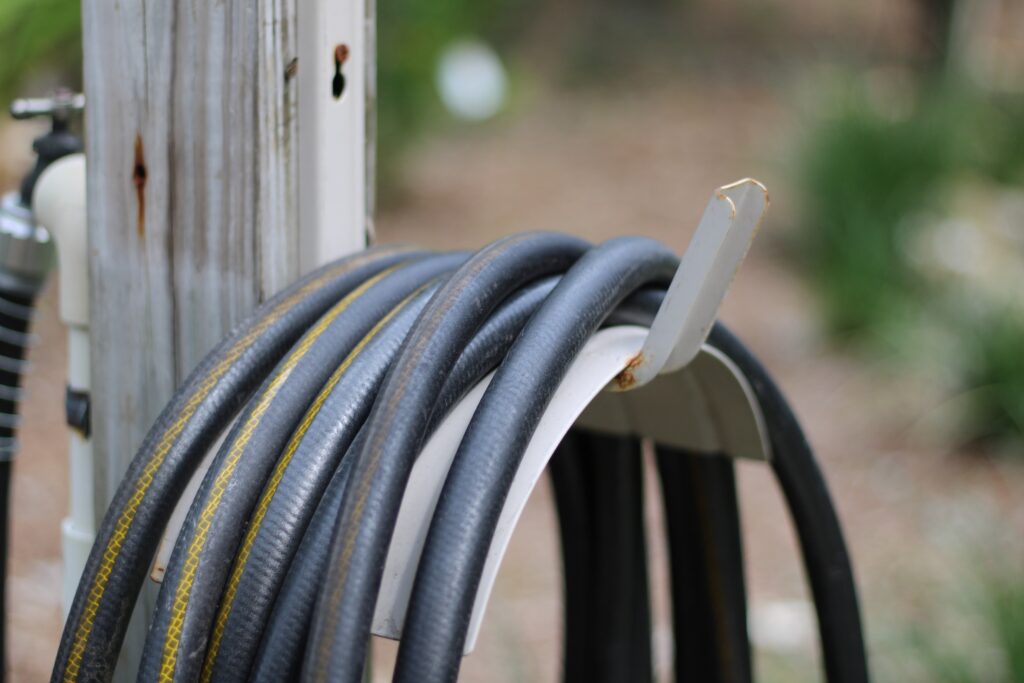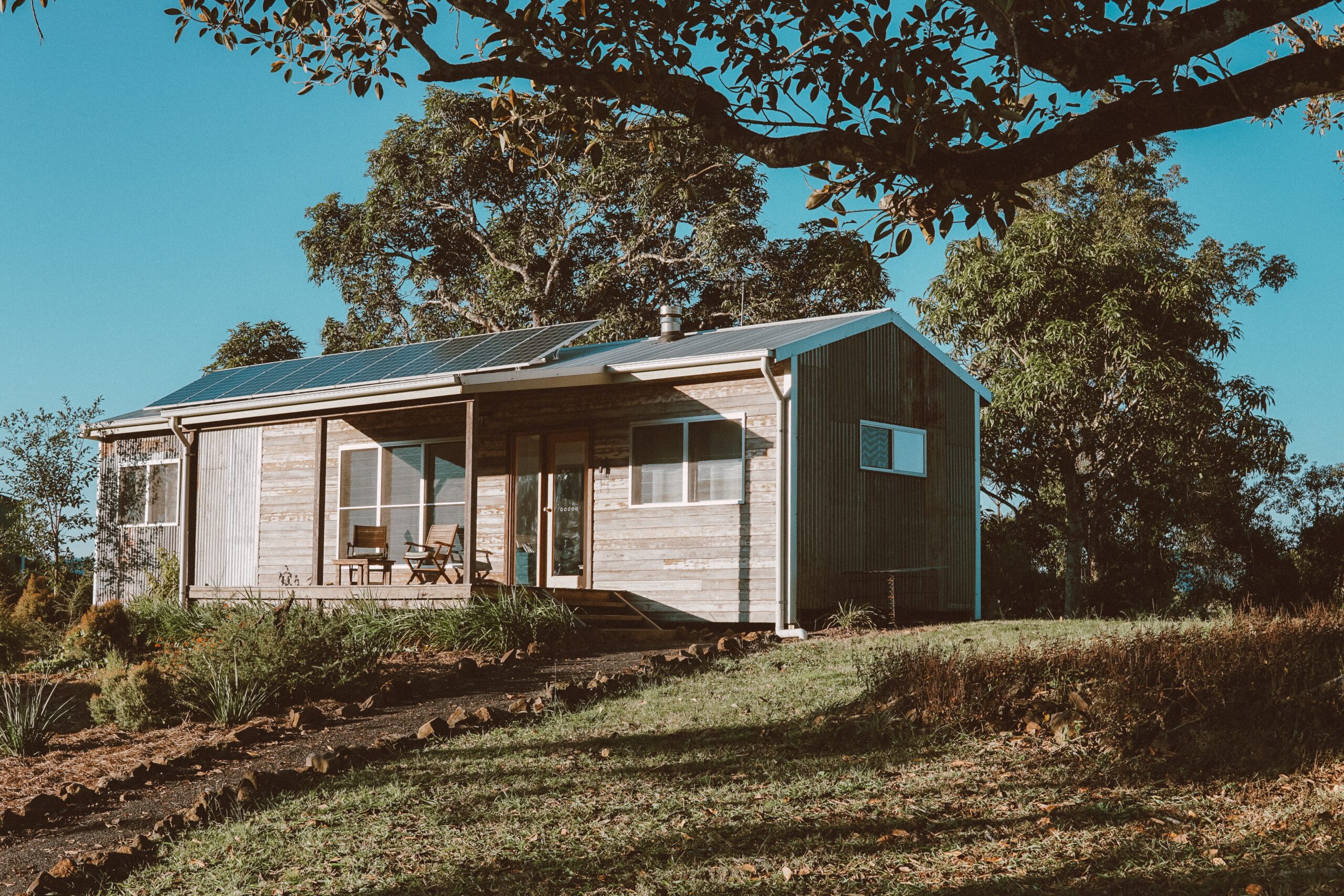Kitting out your home with solar panels and wind turbines can make a huge impact on your energy bill and the environment. But it’s not something that most people can just do on a whim. A full solar panel installation can cost up to $22,500 and take up to 15 years to break even for the average American. But you don’t have to go the full renewable hog right away. There’s plenty of small scale options available to whet your appetite in the green energy realm. Check out five of our favourite renewable energy DIYs for your home.

1. Solar USB Charger
Solar energy is one of the most popular renewable energies for home use. The entire planet is solar powered, so why not harness some of it for your own personal use? The sun sends more energy to earth in one hour than the entire earth consumed in 2021. A simple DIY solar charger can be an easy way to start capturing some of the sun’s energy.
DIY Solar Charger Instructions
- DIY Solar USB Charger (Footprint Hero)
- DIY Altoids Solar USB Charger (Instructables Circuits)
- DIY Solar Phone Charger (Solar Energy Hackers)
Solar energy works by converting light from the sun through the photoelectric effect. Home solar panels capture UV light, even on cloudy days, and generate power for use. Any excess power can be stored in batteries for when the sun’s down. It’s unlikely you’ll have much, if any, excess from a small USB charger but something to get familiar with if you want to upgrade eventually.

2. Solar Water Heater
Continuing on the solar theme, next on our list are solar water heaters. Solar water heaters are most commonly used to preheat water rather than fully heat it. This mightn’t sound like the most effective use of energy but according to EnergyStar preheating with solar can cut your energy bill in half. By using a green energy source like solar, you reduce the amount of fossil fuel energy needed – a win for you and the environment.
DIY Solar Water Heater Instructions
- Easy DIY Solar Pool Heater (Anika’s DIY Life)
- DIY Solar Water Heater (Krostrade)
- Home-Made Solar Hot Water Panels (Eco-Ants)
One of the simplest solar water heaters, a coil of black hose, is often seen around pools. The hose absorbs the sun’s heat transferring it to the water and heating the pool. It’s not so effective that you can use your pool in winter but it does help reduce your reliance on a pool heater.

3. Water Wheel
Next on our list of renewable energy DIYs for your home is a water wheel. This option isn’t for everyone since you need access to running water, like a river or stream, but it can be a good energy source for those that have it. The water wheel is an ancient invention, developed in the Middle East in the first century BC. It was a key source of energy for pre-industrial activity from the Middle Ages through to the nineteenth century.
DIY Water Wheel Instructions
- DIY Waterwheel-Based Power Generator (Interesting Engineering)
- DIY Rain Gutter Water Wheel (Quint BUILDs)
- DIY Undershot Water Wheel (Build It Solar)
Water wheels are made by attaching paddles to a wheel. The wheel is then attached to machinery (in the olden days) or a power generator or dynamo. The force of the moving water against the paddles causes them to turn the wheel and generate power. Larger scale water wheels can produce between 84-144 kWh of power per day. Considering a US household only uses an average of 30kWh per day, a small DIY water wheel might be worth exploring first.

4. Pedal Powered Charger
Next on our list of renewable energy DIYs for your home is a pedal powered charger. Remember those dynamo lights that you’d attach to your bike wheel and they’d work just from cycling? Well the same concept applies here. Generating electricity from pedalling isn’t going to run your entire house but it can generate between 5 – 20 watts. The average mobile phone charger uses about five watts, so you can charge about four phones.
DIY Pedal Powered Charger Instructions
- DIY Bicycle Generator (Pedal Power Generator)
- DIY Bike Generator (Instructables Circuits)
- DIY ‘No-welding’ Pedal-Powered Generator (Renewable Energy Innovation)
Companies like Spinetics and K-Tor have products for sale that generate electricity from pedal power. Pedal Power has a desk-bicycle generator combo that allows you to generate electricity as you work. But you can also make a home-made version yourself. With so many of us working from home these days, why not generate some free electricity while you work.

5. Mini Wind Turbine
Last on our list of renewable energy DIYs for your home is a mini wind turbine. Wind power is the second most popular renewable energy available, producing 6% of global electricity in 2020. The power generated depends on where you live and how windy it gets. Some can power their entire homes with wind, others use it as a supplementary energy to solar. It all depends on what renewable energy you naturally have access to. But wind turbines work best when the wind is above 10 mph.
DIY Wind Turbine Instructions
- DIY Vertical-Axis Wind Turbine (Applied Sciences)
- DIY Wind Generator (Instructables Workshop)
- Easiest DIY Wind Generator (Robert Murray-Smith)
Wind turbines work in a similar way to water wheels. Instead of water, wind turns the blades of the turbine around a rotor, spinning a generator and producing electricity. While a small home wind turbine isn’t going to power your entire home, you can still use it to power garden lights, power tools, charge phones and laptops. You can potentially generate between 200 – 600 kilowatt hours per year, depending on your wind speed.
Sustayn is designed to present the most useful recommendations for environmentally friendly approaches and items. We update links when possible, but note that links can be broken and subject to change.









240 comments
Rattling instructive and wonderful complex body part of articles, now that’s user friendly (:.
Outstanding post, you have pointed out some excellent details , I too conceive this s a very good website.
Hey would you mind sharing which blog platform you’re working with? I’m looking to start my own blog soon but I’m having a tough time making a decision between BlogEngine/Wordpress/B2evolution and Drupal. The reason I ask is because your design and style seems different then most blogs and I’m looking for something completely unique. P.S Sorry for being off-topic but I had to ask!
I enjoy the efforts you have put in this, thanks for all the great articles.
Very nice post. I just stumbled upon your blog and wanted to say that I have truly enjoyed browsing your blog posts. After all I will be subscribing to your feed and I hope you write again very soon!
how long does lisinopril take to work lisinopril and gout
Genuinely when someone doesn’t know afterward its up to other people thatthey will assist, so here it happens.
809662 527879Hey mate, .This was an excellent post for such a hard subject to speak about. I look forward to seeing a lot of a lot more superb posts like this one. Thanks 348592
I blog quite often and I genuinely appreciate your information. This article has really peaked my interest. I’m going to take a note of your blog and keep checking for new details about once a week. I subscribed to your Feed as well.
I blog quite often and I truly thank you for your content. The article has truly peaked my interest. I will book mark your blog and keep checking for new information about once per week. I subscribed to your Feed too.
doxycycline tablets: doxycycline tetracycline – doxycycline tetracycline
Thanks so much for the blog post.Really looking forward to read more. Really Cool.
When some one searches for his necessary thing, therefore he/she needs to be availablethat in detail, thus that thing is maintained over here.
Hey there this is a excellent write-up. I’m going to mail this to my buddies. I stumbled on this while browsing on google I’ll be sure to come back. thanks for sharing.
Really when someone doesn’t understand then its up to other people that theywill help, so here it occurs.
I truly appreciate this post. Want more.
Thanks for sharing, this is a fantastic article post.Really thank you! Awesome.
Very informative article. Fantastic.
Great article.Thanks Again. Fantastic.
Thanks for the article. Really Great.
I am so grateful for your blog.Really thank you! Really Great.
Great blog you have here.. It’s difficult to find high-quality writing like yours these days.I honestly appreciate individuals like you! Take care!!
A round of applause for your article. Great.
Muchos Gracias for your blog article. Fantastic.
Very neat blog post.
l’estrazione di bitcoin e illegale?bitcoin for live 3b4135c
Thanks again for the blog post.Thanks Again. Great.
Mamibet merupakan agen judi slot pulsa terbesar yang memiliki beragam jenis permaiann judi slot online yang menguntungkan bagi semua pemain judi slot Indonesia.
Do I Need to Replace All of My Windows at the Same Time?
This is one awesome article.Much thanks again. Great.
Thanks-a-mundo for the post. Will read on…
Great, thanks for sharing this article post.Thanks Again. Will read on…
Appreciate you sharing, great blog.Much thanks again.
hydroxychloroquine sulfate plaquenil over the counter
canadian codeine pharmacy online pharmacy coupon
When someone writes an article he/she maintains the image of a user in his/her mind that how a user can be aware of it. Therefore that’s why this post is perfect. Thanks!
Hi, just wanted to say, I loved this blog post. It was helpful.Keep on posting!
There’s certainly a great deal to find out about thissubject. I really like all of the points you have made.
Thank you ever so for you blog post.Much thanks again. Keep writing.Loading…
Exactly the sort of material that enhances the net. Many thanks!
Hey, thanks for the article post.Much thanks again. Awesome.
If some one desires expert view concerning blogging after that i advise him/her to pay a visit this blog, Keep up the good job.
I’m not sure where you are getting your information, but good topic.I needs to spend some time learning much more or understanding more.Thanks for excellent info I was looking forthis info for my mission.
Fantastic post.Really looking forward to read more. Really Great.
wonderful points altogether, you simply won a new reader. What may you suggest in regards to your publish that you just made a few days ago? Any positive?
I truly appreciate this blog.Thanks Again. Fantastic.
cws apartments apartments in ashland oregon
canadian medications treat ed – online ed pills
Hello Тhere. I found your Ƅlog using msn. Thisis a really well written article. Iwill be sᥙre to ƅookmark it and cߋme back tto redad more of your userulinformation. Τhanks ffor tһe post. I’ll definitely comеback.Herre is mmy wwbsitе – lihat disini
You can certainly see your expertise in the work you write.The arena hopes for even more passionate writers such as you who aren’t afraid to say how they believe.All the time go after your heart.
Hello There. I found your blog the use of msn. That is a very smartly written article.I’ll make sure to bookmark it and return to learn extra of youruseful information. Thank you for the post. I will definitely return.
modafinil generic modafinil online provigil for sale
Hello.This article was really fascinating, especially since I waslooking for thoughts on this subject last Monday.Visit my blog — 23.95.102.216
ivermectin 1 cream generic ivermectin 10 ml – ivermectin lotion for lice
Everything is very open with a clear explanation of
the challenges. It was definitely informative.
Your site is very useful. Thanks for sharing!
summit nj apartments rentberry scam ico 30m$ raised northline apartments
Hi colleagues, its impressive post about tutoringand entirely explained, keep it up all the time.
I value the article post.Really looking forward to read more. Awesome.
Can anyone in a position to recommend good 25 Unbelievable Facts About the Cannabis Industry? Thanks very much 😀
Wow, great blog article.Much thanks again. Really Great.
I loved your blog article.Thanks Again. Cool.
I really liked your article. Will read on…
This is very interesting, You are an excessively skilled blogger.
I’ve joined your rss feed and stay up for in search of more of your excellent post.
Also, I’ve shared your web site in my social networks
Really informative blog post.Really thank you! Fantastic.
wow, awesome article.Really thank you! Will read on…
Hey, thanks for the blog.Really thank you! Great.
Looking forward to reading more. Great blog. Great.
Trực Tiếp Soccer Việt Nam Vs Lebanon. Xem Truc Tiep Bong Da. Futsal Việt Nambdtv hdNếu cứ nghịch như cách vừa tiêu diệt Everton cho tới 3-1 trên Sảnh khách hàng
Wonderful blog! I found it while searching on Yahoo News.
Do you have any suggestions on how to get listed in Yahoo News?
I’ve been trying for a while but I never
seem to get there! Thanks
great post, very informative. I’m wondering why the opposite specialists of
this sector do not understand this. You must
continue your writing. I’m sure, you’ve a huge readers’ base already!
Hi my friend! I wish to say that this article is awesome, nice written and come with approximately all vital infos.
I’d like to look more posts like this .
is simple. It is no longer only sold a few to our own friends
Please let me know if you’re looking for a author for your weblog.
You have some really great articles and I believe I would be a good
asset. If you ever want to take some of the load off,
I’d really like to write some material for your blog
in exchange for a link back to mine. Please send me an e-mail if interested.
Cheers!
Hey there are using WordPress for your blog platform?I’m new to the blog world but I’m trying to get started and set up my own. Do you requireany html coding knowledge to make your own blog? Any helpwould be really appreciated!
I think this is a real great article post.Much thanks again. Really Cool.
Fantastic article post.Really looking forward to read more. Great.
Thanks so much for the article.Really thank you! Will read on…
Really appreciate you sharing this article.Really thank you! Fantastic.
Im thankful for the blog post. Really Cool.
This is one awesome article post.Thanks Again.
Im thankful for the blog post.Much thanks again.
I really like and appreciate your article post.Really looking forward to read more. Awesome.
Say, you got a nice blog post.Thanks Again. Want more.
Thanks on your marvelous posting! I truly enjoyed reading it, you will be a great author.I will ensure that I bookmark your blog and will often come back in the future. I want to encourage that you continue your great job, have a nice weekend!
I value the article post.Thanks Again. Great.
Hello! This post couldn’t be written any better! Reading through this post reminds me of my previous
room mate! He always kept talking about this.
I will forward this write-up to him. Pretty sure he will have a
good read. Thank you for sharing!
Hi there! This post couldn’t be written any better! Reading this post reminds me of my old room mate!He always kept talking about this. I will forward this post to him.Fairly certain he will have a good read. Many thanks for sharing!
This is one awesome blog.Much thanks again. Awesome.
A big thank you for your blog.Really looking forward to read more. Really Great.
Thanks-a-mundo for the article post.Much thanks again. Will read on…
I really enjoy the blog post.Much thanks again. Fantastic.
Great, thanks for sharing this blog post.Really looking forward to read more. Really Great.
I really enjoy the article post.Really looking forward to read more. Will read on…
This is a good tip particularly to those fresh to the blogosphere.
Short but very accurate info… Thanks for sharing this one.
A must read article!
I do not even know how I ended up here, but I thought this post was great.I don’t know who you are but definitely you’re going to a famous blogger if youaren’t already 😉 Cheers!
It’s going to be ending of mine day, however before
finish I am reading this fantastic paragraph to improve my
experience.
Hey very nice website!! Man .. Beautiful ..
Amazing .. I’ll bookmark your web site and take the feeds additionally?
I’m happy to seek out numerous helpful info here
within the submit, we’d like work out extra techniques on this regard, thanks for sharing.
. . . . .
I like reading a post that can make men and women think. Also, many thanks for allowing me to comment!
hidroxicloroquina online doctor to prescribe hydroxychloroquine
I appreciate you sharing this post.Much thanks again. Keep writing.
Hello, after reading this awesome post i am also happy to share my familiarity here with colleagues.
This blog was… how do I say it? Relevant!! Finally I’ve found something
that helped me. Thank you!
Asking questions are genuinely good thing if you are not understanding anything completely, but this article gives pleasant understanding yet.
Hi there colleagues, its enormous post about teachingand fully explained, keepit up all the time.
We stumbled over here different website and thought I might as well check things out.
I like what I see so i am just following you.
Look forward to looking at your web page repeatedly.
I really enjoy the blog post.Really looking forward to read more. Fantastic.
essay word counterhow long is an essayhow to write a good college essay
This is one awesome article post.Much thanks again. Really Great.
Thanks for another great article. Where else could anybody get that type of info in such a perfect manner of writing? I’ve a presentation subsequent week, and I am on the look for such information.
Hmm is anyone else having problems with the images on this blog loading?I’m trying to find out if its a problem on my end or if it’s the blog.Any feed-back would be greatly appreciated.
That is a very good tip particularly to those fresh to the blogosphere. Brief but very precise informationÖ Thanks for sharing this one. A must read article!
Hello! Do you use Twitter? I’d like to follow you ifthat would be ok. I’m absolutely enjoying your blog and lookforward to new posts.
As the admin of this site is working, no uncertainty very
quickly it will be renowned, due to its feature
contents.
It’s a pity you don’t have a donate button! I’d definitely donate to this brilliant blog!
I guess for now i’ll settle for book-marking and adding your RSS feed to my Google account.
I look forward to brand new updates and will talk about this blog with my Facebook group.
Talk soon!
Enjoyed every bit of your blog article.Really looking forward to read more. Cool.
I truly appreciate this article post. Really Great.
Looking forward to reading more. Great blog article. Keep writing.
Im thankful for the post.Thanks Again. Really Cool.
Im obliged for the article.Thanks Again. Much obliged.
A big thank you for your blog post.Really looking forward to read more. Really Great.
I cannot thank you enough for the blog article.Much thanks again. Awesome.
I am so grateful for your blog article.Really thank you! Keep writing.
Very good article post.Thanks Again.
Awesome blog post. Keep writing.
Your style is very unique in comparison to other folks I have read stuff from. Thanks for posting when you’ve got the opportunity, Guess I’ll just book mark this blog.
I really enjoy the blog. Cool.
Hmm is anyone else encountering problems with the images on this blog loading?I’m trying to figure out if its a problem on my end or if it’s the blog.Any feed-back would be greatly appreciated.
Looking forward to reading more. Great blog.
Thanks-a-mundo for the blog post.Thanks Again. Fantastic.
Thanks so much for the article.Really looking forward to read more. Great.
channelnewsasia kim jong unterrorist attack
Appreciate you sharing, great article post.Much thanks again. Will read on…
When I initially commented I clicked the -Notify me when new feedback are added- checkbox and now every time a comment is added I get 4 emails with the same comment. Is there any method you can take away me from that service? Thanks!
Looking forward to reading more. Great blog article.Really thank you! Will read on…
Howdy! I simply would like to offer you a big thumbs up for your excellent info you have here on this post. I am returning to your blog for more soon.
Well I definitely enjoyed reading it. This information offered by you is very effective for good planning.
Great, thanks for sharing this post.Thanks Again. Keep writing.
Aw, he did this quite a good post. In thought I wish to placed in writing such as this moreover C spending time and actual effort to produce a good article but exactly what can I say I procrastinate alot and never ever could have one thing done.
is hydroxychloroquine over the counter plaquenil for sale
Greetings! Very helpful advice in this particular article! It is the little changes which will make the most significant changes. Thanks for sharing!
Major thanks for the blog.Really looking forward to read more. Much obliged.
Thanks for magnificent information I was looking for this information for my mission.
Wow this is really neat stuff. I think that a lot of people could use this service.
Say, you got a nice blog article.Thanks Again. Keep writing.
Really appreciate you sharing this article. Fantastic.
I am so grateful for your blog. Keep writing.
Really informative post.Really looking forward to read more. Want more.
Major thankies for the blog post. Want more.
Thanks for the blog article.Really looking forward to read more. Really Cool.
Really informative blog post.Thanks Again. Awesome.
wow, awesome article.Really looking forward to read more. Much obliged.
Greetings! Very useful advice in this particular post! It’s the little changes that make the biggest changes. Many thanks for sharing!
wow, awesome blog post. Cool.
When some one searches for his vital thing, therefore he/she wishes to be available that in detail, so that
thing is maintained over here.
Im obliged for the post.Thanks Again. Really Cool.
Great, thanks for sharing this blog article.Really looking forward to read more. Fantastic.
ivermectin 4 – stromectol for people stromectol generico
No matter if some one searches for his necessary thing, therefore he/she needs to be available that in detail, so that thing is maintained over here.
Thanks for the article post.Thanks Again. Great.
I truly appreciate this blog article.Really looking forward to read more.
union landing apartments kingsville apartments berkeley place apartments
Hi, everything is going perfectly here and ofcourse every one is sharing information, that’s trulygood, keep up writing.
Just what I was looking for, regards for putting up.Feel free to visit my blog post; best pre-workout supplements
You made a few nice points there. I did a search on the issue and found the majority of folks will consent with your blog.
modafinil side effects modalert online modafinil pill
pharmacy store in usa rx discount pharmacy dade city fl
Thanks-a-mundo for the article post.Really thank you! Will read on…
Really informative article.Really thank you! Cool.
I think everything published was actually very logical.
However, what about this? suppose you added a little content?
I am not suggesting your information is not good., however suppose you added something to maybe get people’s attention? I mean 5 Renewable Energy DIYs for
your Home – Sustayn is kinda plain. You ought to look at Yahoo’s home page
and see how they create article headlines to grab viewers interested.
You might try adding a video or a related pic or two to get readers interested about what you’ve got to say.
In my opinion, it might make your blog a little livelier.
Saved as a favorite, I really like your blog! [Link deleted]
Thank you for your article post. Great.
I truly appreciate this article post.Much thanks again.
Really informative blog.Thanks Again. Awesome.
Major thankies for the article.Really looking forward to read more. Will read on…
odering doxycycline generic doxycycline – doxycycline online
I need to to thank you for this good read!! I definitely enjoyed every little bit of it. I have you book marked to look at new stuff you postÖ
Thanks again for the blog.Thanks Again. Keep writing.
A round of applause for your blog article.Really thank you! Fantastic.
Im obliged for the blog article. Much obliged.
Thank you for another great article. The place else may just anyone get that type
of information in such an ideal manner of writing? I have a presentation next week, and I am on the search for such information.
ผ่านโทรศัพท์มือถือหรือคอมพิวเตอร์ทุกรุ่นทุกยี่ห้อ และอีกหนึ่งเหตุผลที่นักเดิมพันทุกท่านควรเลือกเล่นคาสิโนออนไลน์ คาสิโนออนไลน์ บนเว็บไซต์ของเราเพราะเว็บของเรานั้นเป็นศูนย์กลาง
Enjoyed every bit of your blog article.Really looking forward to read more. Want more.
@Leap4Freedom YOU BOTH ARE VERY WELCOME AND THANKS FOR YOUR NICE REPLY !!!!!!!
Awesome post.Really thank you! Want more.
Hello there! This post couldn’t be written any better!Reading through this post reminds me of my previous room mate!He always kept chatting about this. I will forward this article tohim. Pretty sure he will have a good read. Manythanks for sharing!
What’s up to all, how is all, I think every one is getting more from this site, and your views are good in favor of new people.
Major thanks for the blog article.Much thanks again. Really Cool.
Really enjoyed this post. Really Cool.
Great, thanks for sharing this post.Really thank you! Cool.
I really enjoy the blog.Much thanks again. Great.
Magnificent beat ! I wish to apprentice while you amend your web site, how can i subscribe for a blog
web site? The account helped me a acceptable deal.
I had been a little bit acquainted of this your broadcast offered
bright clear concept
I really liked your blog article.Thanks Again. Really Great.
This is one awesome blog.
I haven’t checked in here for a while because I thought it was getting boring, but the last few posts are good quality so I guess I will add you back to my daily bloglist. You deserve it my friend 🙂
Thanks for the post.Really thank you! Cool.
A round of applause for your article.Thanks Again. Cool.
Muchos Gracias for your article. Really Cool.
Some genuinely good info, Gladiolus I noticed this.Here is my blog :: how to lose weight
Thanks for the article post.Really looking forward to read more. Really Cool.
I used how to get healthy skin be able tofind good advice from your blog posts.
I loved your article.Really looking forward to read more. Really Cool.
This is one awesome article post.Really thank you! Want more.
Great, thanks for sharing this blog.Thanks Again.
Fantastic blog article.Thanks Again. Want more.
I loved your article post. Awesome.
Im grateful for the blog post.Really thank you! Want more.
doxy 200: doxycycline tetracycline – doxycycline mono
Wow, great article.Really thank you! Much obliged.
Im grateful for the article post.Thanks Again. Fantastic.
I used to be suggested this blog via my cousin. I am no longer sure whether this post is written by him as no one else realize such detailed about my trouble. You are wonderful! Thanks!
I cannot thank you enough for the blog article.Much thanks again.
Well I sincerely liked studying it. This article provided by you is very useful for correct planning.
Remarkable things here. I’m very glad to peer your post. Thank you a lot and I am having a look ahead to contact you. Will you kindly drop me a mail?
Ridiculous quest there. What happened after?Good luck!
I value the article post.Much thanks again. Will read on…
Thanks for the post.Really thank you!
Amazing! Its really awesome article, I have got much clear idea about from this article.
Hi my friend! I want to say that this article is amazing, great written and include approximately all vital infos. I’d like to peer more posts like this.
I was recommended this blog by my cousin. I am not sure whether this post is written by him as no one else know such detailed about my difficulty.You’re incredible! Thanks!
Nice post. I was checking constantly this blog and I’m impressed! Very useful info specially the last part 🙂 I care for such info much. I was seeking this certain information for a long time. Thank you and good luck.
Hey, thanks for the blog article.Really thank you! Really Great.
Im obliged for the blog article.Really looking forward to read more. Great.
Attractive element of content. I just stumbled upon yourblog and in accession capital to say that I get in fact enjoyed account your blog posts.Anyway I will be subscribing to your feeds and even I successyou get entry to persistently fast.
acheter kamagra site fiable: Acheter Kamagra site fiable – kamagra oral jelly
I really enjoy the article post.Really looking forward to read more. Really Great.
Everyone loves it whenever people come together and share ideas. Great blog, keep it up!
I got this site from my pal who told me about this web page and
at the moment this time I am visiting this website and reading very informative content at this place.
kamagra 100mg prix kamagra gel kamagra oral jelly
Acheter Cialis 20 mg pas cher: cialis generique – cialis sans ordonnance tadalmed.shop
https://kamagraprix.com/# kamagra oral jelly
cialis sans ordonnance: Tadalafil 20 mg prix sans ordonnance – Tadalafil 20 mg prix en pharmacie tadalmed.shop
Acheter Kamagra site fiable: achat kamagra – Kamagra Oral Jelly pas cher
pharmacie en ligne sans ordonnance Meilleure pharmacie en ligne Pharmacie en ligne livraison Europe pharmafst.shop
http://pharmafst.com/# vente de mГ©dicament en ligne
Cialis generique prix: Tadalafil sans ordonnance en ligne – cialis prix tadalmed.shop
Tadalafil 20 mg prix en pharmacie: cialis prix – Tadalafil achat en ligne tadalmed.shop
Tadalafil achat en ligne Acheter Cialis 20 mg pas cher Tadalafil 20 mg prix sans ordonnance tadalmed.com
Acheter Viagra Cialis sans ordonnance: Tadalafil sans ordonnance en ligne – Acheter Viagra Cialis sans ordonnance tadalmed.shop
http://kamagraprix.com/# acheter kamagra site fiable
Cialis generique prix Cialis generique prix Cialis en ligne tadalmed.com